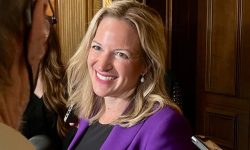Dana Nessel loses FOIA case, ordered to release Whitmer kidnapping records

- A judge ordered A.G. Dana Nessel to release documents connected to the Gov. Gretchen Whitmer kidnapping plot
- Nessel’s office had denied a FOIA request for the documents
- These particular documents had been shown in an open preliminary hearing
Michigan Attorney General Dana Nessel’s office must make public some documents related to the criminal case of men accused of attempting to kidnap Gov. Gretchen Whitmer.
In a 13-page ruling released Wednesday, Michigan Court of Claims Judge James Robert Redford ordered Nessel to release exhibits that were introduced in open court in preliminary examinations against eight defendants charged in state court in the kidnapping case, in hearings in Antrim and Jackson counties.
The ruling was a rebuke of Nessel’s practice of publicly championing government transparency while refusing to release documents introduced in open court. Bridge Michigan and the Detroit Free Press have sought records, including search warrant affidavits, related to high-profile criminal cases or investigations undertaken by the attorney general’s office, though the media outlets were not parties to the lawsuit ruled on Wednesday.
Related:
- Michigan AG Dana Nessel keeps Chatfield, Whitmer kidnapping records secret
- Judge sides with Dana Nessel, keeps secret Lee Chatfield warrants
- Feds assisting probe of former Michigan House Speaker Lee Chatfield
Eric VanDussen, a Benzie County-based independent journalist and documentary filmmaker, had filed a Freedom of Information Act request for the documents last September, and, when that request was turned down by the attorney general’s office, he took the office to court.
The judge ordered that any exhibits presented in preliminary hearings must be released to the public in the same form in which they were presented to the court, without additional redactions.
Nessel's office said Thursday it will not fight the judge's ruling. "The Department intends to comply with yesterday's court order and turn over the documents and exhibits with all deliberate speed," spokesperson Danny Wimmer told Bridge in an email.
VanDussen has fought to allow the public to see more documents connected to the Whitmer kidnapping plot criminal cases. He is working on a documentary film about extremism in Michigan, an issue Nessel has repeatedly said is a key problem facing the state.
The cases stem from a 2020 effort by members of Wolverine Watchmen, a Michigan militia group, to kidnap the governor, a scheme sparked by Whitmer’s lockdown policies impacting schools and businesses during the first year of the pandemic.
A total of 14 men were charged in the kidnapping plot, with eight being prosecuted by Nessel's office in state court, and six in federal court. Three defendants in Antrim County are still awaiting trial.
The state produced approximately 100 exhibits during a preliminary exam in 2022 for five men accused in the Whitmer case. According to the Traverse City Record-Eagle, those exhibits included video clips recorded by an undercover officer and on a dash camera as some defendants surveilled the governor’s vacation home near Elk Rapids; transcripts of phone calls between some defendants and undercover officers, and screenshots of texts and private social media messages.
Both the Record-Eagle and VanDussen filed Freedom of Information Act requests for the documents with Nessel’s office. Those requests were denied, with the AG claiming the documents constituted attorney work product that was exempt from FOIA.
On Wednesday, Judge Redford dispensed with that defense.
“The documents at issue were offered by the Attorney General’s office as exhibits in open court, in a public hearing, in a public trial, in a public courthouse,” Redford wrote. “Some of the exhibits were simultaneously displayed over social media. There were, to this Court’s understanding, no motions made by the Attorney General’s office seeking closure of the proceedings, protective orders, or any other prophylactic measures as relates to the requested documents.
“For purposes of the FOIA, records such as the exhibits plaintiff seeks are no longer records that are investigatory, or ‘compiled for law enforcement purposes’ once they have been used in a preliminary examination or other open court proceeding,” the ruling continued.
The judge gave both sides three weeks to submit briefs on whether the plaintiff in the case is entitled to collect attorney’s fees from the state for having to bring the litigation.
The case is one of several high-profile proceedings in which Nessel has attempted to shield documents from the public, citing the need to protect ongoing investigations. In addition to the document battle in the kidnapping cases, her office has also fought efforts by Bridge and the Free Press to gain access to search warrant affidavits in connection to a criminal investigation into former Michigan Speaker of the House Lee Chatfield.
Since Nessel took office in 2019, she has called for greater transparency and accountability from other institutions and governmental units, including police, utility lobbyists, the Ottawa County Board of Commissioners, Michigan State University and Oxford Community Schools.
In 2019, Nessel spoke to a gathering of the Michigan Press Association about transparency, particularly the Freedom of Information Act, saying journalists were “absolutely committed to finding out what’s going on behind closed doors, they need to make certain that officials like myself are compliant because that’s the only way the public can have any confidence in the work that we’re doing.”
See what new members are saying about why they donated to Bridge Michigan:
- “In order for this information to be accurate and unbiased it must be underwritten by its readers, not by special interests.” - Larry S.
- “Not many other media sources report on the topics Bridge does.” - Susan B.
- “Your journalism is outstanding and rare these days.” - Mark S.
If you want to ensure the future of nonpartisan, nonprofit Michigan journalism, please become a member today. You, too, will be asked why you donated and maybe we'll feature your quote next time!




